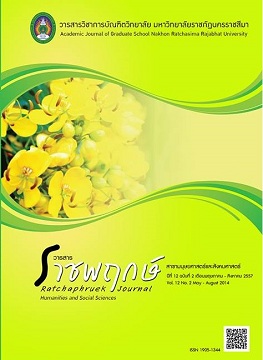The Effects of Positive Self-talk Training Program on Emotional Intelligence of the First Year Students of Nakhon Ratchasima Rajabhat University
Main Article Content
Abstract
This quasi-experimental research was conducted to study the effects of positive self-talk training program on emotional intelligence of the first year students of Nakhon Ratchasima Rajabhat University. The samples were 10 students in English program and 10 students in Music program. All 20 students studied in the second semester of academic year 2013. The experiment was used as instruments, which were1) positive self-talk training program for 2 weeks, 4 days a week from Tuesday-Friday at 60 minutes a day, and 2) an evaluation format of emotional intelligence for people aged 18-60 year. The data collection was divided into 2 phases according to the length of pretest and posttest, and they were then analyzed by t-test.
The results showed that
1 . Posttest experimental group students had an average score of emotional intelligence higher thanbefore the experimentat .01 level of significance.
2 . Posttest experimental group students had an average score of emotional intelligence higher than these of the control groupat .01 level of significance.
Article Details
References
เคียงขวัญ มหาโชคเลิศวัฒนา. (2554). ผลของโปรแกรมการฝึกพูดกับตนเองทางบวกที่มีต่อการเห็นคุณค่าในตนเองของนักเรียนชั้นประถมศึกษาปีที่ 4. วิทยานิพนธ์ครุศาสตรมหาบัณฑิต สาขาจิตวิทยาการศึกษา คณะครุศาสตร์ จุฬาลงกรณ์มหาวิทยาลัย.
ชนัดดา เพ็ชรประยูร, ชูศรี เลิศรัตน์เดชากุล และนนทิรัตน์ พัฒนภักดี. (มกราคม - เมษายน 2554). “ความสามารถในการปรับตัวของนักศึกษาชั้นปีที่ 1 ในมหาวิทยาลัยของรัฐ.” วารสารวิชาการพระจอมเกล้าพระนครเหนือ. 21(1) : 157-159.
วีระวัฒน์ ปันนิตามัย. (2551). เชาวน์อารมณ์ (EQ) ดัชนีเพื่อความสุข และความสำเร็จของชีวิต. พิมพ์ครั้งที่ 7. กรุงเทพฯ : สำนักพิมพ์แห่งจุฬาลงกรณ์มหาวิทยาลัย.
วุฒิพงศ์ ลิมป์วิโรจน์. (ม.ป.ป.). ปัญหาที่พบบ่อยในช่วงที่กำลังศึกษาในระดับอุดมศึกษา. [ออนไลน์]. แหล่งที่มา : http//www.lpc.rmutl.ac.th/guidance/…/062_report_reseach01. pdf. [16 มกราคม 2556].
สำนักพัฒนาสุขภาพจิต กรมสุขภาพจิต กระทรวงสาธารณสขุ . 5 เรื่องน่าร้เู กี่ยวกับอีคิว. [ออนไลน]์ . แหล่งที่มา : http://203.157.56.11/factsheet/text_show.php? chapter_id=159&book_id=4 [31 สิงหาคม 2555].
อัจฉรา สุขารมณ์ และอรพินทร์ ชูชม. (2548). โปรแกรมการส่งเสริมและพัฒนาความฉลาดทางอารมณ์ ตามแนวคิดตะวันออกสำหรับเยาวชนไทย เพื่อคุณภาพชีวิตที่ดี. รายงานการวิจัยฉบับที่ 102 สถาบันวิจัยพฤติกรรมศาสตร์ มหาวิทยาลัยศรีนครินทรวิโรฒ.
อุสา สุทธิสาคร. (ม.ป.ป.). บทที่ 4 เชาวน์อารมณ์ (EQ) และเชาวน์ปัญญา (IQ). [ออนไลน์]. แหล่งที่มา : http://department.utcc.ac.th/cte/images/stories/Download/ge/data/HG022/loadlesson4.pdf [19 กรกฎาคม 2555].
Corey, G. (2004). Theory and Practice of Group Counseling. 6th ed. CA : Brooks/cole.
Depape, A. -M. R., et al. (2006). “Self-Talk and Emotional Intelligence in University Students. University of Windsor.” Canadian Journal of Behavioural Science. 38 (2) : 250-260.
Nelson-Jones, R. (2004). Effect Thinking skill. 4th ed. London : SAGE.


